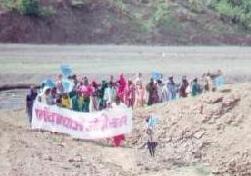|
Indian
Court Ruling a Blow to Dam Protesters Coninuing PlaNet coverage of the Narmada Dam debacle which has become a touchstone for the struggle between millions of local people and the institutions and companies that make up the `global economy'. By a majority of two to one, India's Supreme Court has allowed work on the half finished Sardar Sarovar Dam to continue, rejecting calls for an environmental survey to be carried out. The US$5 billion gravity dam on the Narmada River in the western state of Gujarat is part of the Narmada Valley Development Project scheme. The Indian government plans to build 30 large, 135 medium and 3,000 small dams to harness the waters of the Narmada and its tributaries. It is estimated that more than 300,000 people will have to be resettled from land to be flooded under the project, which will supply water for hydropower, irrigation, and municipal andindustrial water supply. The Sardar Sarovar Dam currently stands at 88 meters but will rise to 163 meters when finished. Proponents of the dam claim that it will provide large amounts of water and electricity which are desperately needed to develop a poor area. Opponents question the basic assumptions of the Narmada Valley Development Plan. They believe the displacement of so many people living in poor and underprivileged communities is an abuse of human rights. They claim the plan rests on false and unfounded assumptions of hydrology and seismicity in the area. They argue that water and energy can be provided to the people of the Narmada Valley, Gujarat and other regions through alternative technologies and planning processes, which can be socially just and economically and environmentally sustainable. Medha Patkar, a commissioner of the World Commission on Dams, called today's verdict by the Indian Supreme Court "illogical, dangerous and anti-people. "The Supreme Court has violated the spirit of the constitution of India and democratic governance," she said. "The court has totally neglected the fundamental rights of the most vulnerable section of our society and also the serious issues raised regarding the propriety of the dam. "Instead, it has provided a weapon in the hands of the power holders to indiscriminately displace the project affected people and crush their rights." Patkar vowed to fight the judiciary and its decision "tooth and nail. "We call upon the people of India who value democracy and constitution to challenge this decision and ask the court to restore the people's rights in the Narmada valley." The court case was brought by the foremost campaign group, Narmada Bachao Andolan (Save The Narmada Campaign). Its lawsuit filed in the public interest alleged that the dam's impact studies were incomplete and environmental and other conditions unfulfilled. One of the three judges, Justice S.P. Bharucha, wanted all construction activities at the dam site to stop so that a detailed environmental survey could be carried out. But he was outvoted by Chief Justice A.S. Anand and B.N. Kirpal, who said they were satisfied by the relief and rehabilitation measures taken by the state authorities. Their decision means that the dam can be raised by two meters, to 90 meters. But the judges ruled that to raise the dam beyond 90 meters would need approval from an environmental authority appointed to undertake the task. In a joint statement, Venu Govindu and Subramaniam Vincent of the Friends of River Narmada, expressed solidarity with Narmada Bachao Andolan, and echoed calls for the campaign against the dam to continue. "The design and planning process of the Sardar Sarovar Project has been inherently unjust, without an iota of people's participation," the said. "The different state governments and the Union of India has exhibited a singular lack of interest and concern towards the welfare of the poor and underprivileged people whose lives would be devastated by this project. "Moreover, there is a heap of evidence that lays bare the fundamental flaws inherent to the cost benefit analysis of the entire Narmada Valley Development Plan. In the face of such remarkable evidence, the Supreme Court judgment delivered today on the project is a mockery of justice and egalitarianism in a democratic society." In the early 1990s, the World Bank commissioned its first ever independent review of a World Bank financed project to investigate problems associated with the Sardar Sarovar dam. The resulting review, known as the Morse Report after its leader, Bradford Morse, concluded that numerous violations of the Bank's environment and resettlement policies had occurred and the Bank should "step back" from the project. In 1993, the government of India requested that the World Bank withdraw its support for the project. The Supreme Court halted work on raising the height of the dam in January 1995. But last year, it lifted a four year moratorium on the dam's construction, allowing work to raise the dam wall from 80.3 meters to 88 meters.
|


